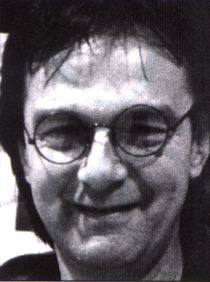Canadian Theatre Encyclopedia
Fennario, David

Playwright born David Wiper in 1947 in Verdun, an Anglophone working-class city near Montreal, Quebec, which would be the setting for most of his plays. He was one of six children; his father was a housepainter. His pen name, given to him by a girlfriend, was from a Bob Dylan song, "Pretty Peggy-O."
Fennario worked in a number of small jobs, including in a warehouse (which he depicts in his play On The Job) before he enrolled in Dawson College and was encouraged by a teacher to publish his journal - Without a Parachute (eventually adapted as a play in 1978 and directed by Gaëtan Charlebois). The journal was seen by Centaur Theatre Artistic Director Maurice Podbrey who brought Fennario to the Centaur to see how a theatre works.
Fennario's first play, On the Job, was produced at the Centaur in 1975 and became an immediate success. His subsequent plays - Nothing to Lose (1976), Toronto (1978), Balconville (1979), Moving (1983), The Murder of Catherine Parr (1986) - would all be produced at the Centaur to huge success, some touring across the province and nationally and, in Balconville's case, internationally. This play would also be produced for television. In 2019, Centaur Theatre produced Balconville to celebrate the 40th anniversary of the play, featuring Fennario's son, Tom.
Fennario wrote another work for the Centaur, the controversial The Death of René Lévesque (1990) that was lambasted by some critics, particularly the Montreal Devoir critic, Robert Lévesque, who levelled charges of anti-Quebec racism at the writer.
Fennario in his heyday was a darling of the Montreal Anglophone scene even while he maintained his Marxist politics and continued to work to bring the problems of the working class to public attention. The rupture in his relationship with theatre professionals began when he picketed the Place des Arts revival of Balconville in sympathy with the union ushers of the hall.
He eventually broke away from mainstream theatre to work in community theatre. His agitprop work Joe Beef was produced by the Blackrock Community Group, which he co-founded in Verdun. He has also written and performed in one-man shows: Banana Boots is about his life in the theatre; Gargoyles tells the history of his beloved Verdun from a working class point of view.
Although he has said that he considers all of his plays which premiered at Centaur Theatre "political and artistic failures," he returned to the Centaur in November 2005 for the premiere of Condoville (dir. Gordon McCall, which revisits the characters in Balconville twenty-six years later, when the pressures of an upwardly mobile marketplace in Montreal are threatening to dislodge them from their tenement – now renovated as a condo Co-op. The language difficulties of the past are now replaced by worries about the rising cost of real estate, and conflicts with two new tenants, a gay couple, one of whom is from the Congo. As in the earlier play, the characters speak in colloquial French (joual) and English, and the dialogue is peppered with witty one-liners and expletives.
Fessenden's Follies was adapted for radio and performed before a live audience for local community radio stations. It was broadcast December 23 and 24, 2006 on 37 community radio stations in Canada, the US and in Scotland. It commemorates the 100th anniversary of the invention of radio by Canadian Reginald Fessenden in 1906. Fessenden (born in Milton, Quebec in 1866) is also credited with inventing the radio compass, the sonic depth finder, as well as an array of warship and submarine gadgets.
Fennario performed in the premiere of his dramatic monologue, Fennario's War at Concordia University, Montreal, February 21, 2009. It is a graphic account of the horrors of WWI trench warfare from the perspective of a veteran soldier, which debunks the nation-building myth of Vimy Ridge. In November 2010, it was produced by Infinitheatre as Bolsheviki.
In 2002, Fennario was diagnosed with Guillain-Barée syndrome, a debilitating nerve disease that has limited his ability to write, although he has still been able to perform -- talking "to and with the audience," not pretending to be someone else. He prefers the British style of acting over "film acting": "to show the showing of the character", which he believes was the strength of Douglas Campbell's acting.
Fennario has won the Chalmers Award twice (On the Job 1976 and Balconville 1979), and received the Prix Pauline Julien from the United Steelworkers' Union for Joe Beef in 1986.
His plays are published by Talonbooks. He died September 16, 2023 at the age of 76.
Viewings: Fennario, National Film Board, 1996
Profile by Gaetan Charlebois and Anne Nothof
Last updated 2024-08-20

